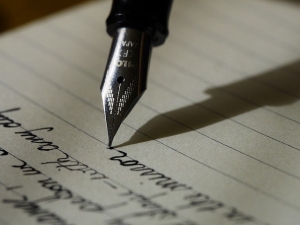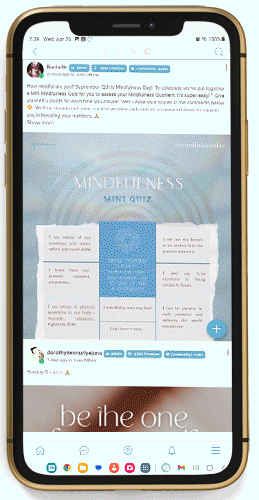‘Journaling’ is one activity that I feel strongly loyal to and which offers great comfort. It is something that I began as a teenager quite instinctively – and it has helped immensely throughout my life. I am often asked ‘how to’ journal and so here, if I can help make your experience of journal writing more rich in content and in what your practice offers and reveals to you, then perhaps you will enjoy its valuable guidance as a reminder that you are never alone, that you always have what answers you need – and that journaling is but one path to discovering your sacred truth.
The first secret: Consider what you want to accomplish from journal writing. What do you want it to ‘gift’ you with? Are you looking for answers and guidance to help you in your life? Do you want a place in which to record how you feel even when how you are feeling is not ideal? Do you want journal writing to help you establish a closer – more intimate connection within yourself? Or is there another purpose for this practice that you look to?
The First Secret: Know what you want from your journaling practice. What would you like your journal writing to offer – to ‘gift’ you with?
Next, consider that journal writing is a tool to re-establish a personal connection with yourself. In a world where we are somewhat distracted by the lives of others; where we compare what we have and do not have and where we are told what we must do and be in order to have success – journalizing is an opportunity for you to refocus attention on yourself; to practice this in your writing helps make it easier for you to make this a habit beyond your journal practice – to living your life with a healthy focus inward and on discriminating based on what is most important to you. One of the many benefits inherent in journal writing is how it teaches us to return inward; to go within ourselves – to share our innermost desires, our feelings, and what we are contemplating – and it does so in a framework of simply revealing this without the need to look anywhere for the answer; for allowing our own voice to be heard – and of seeing our words whether written on the pages of a notebook, or in digital form; because what matters most is that we have a voice – and that we listen to it for guidance, insight, and as a reminder of our need to connect inward; to be one with our self – and to do this often.
Secret Two: Let journal writing be a place for you to off load what thoughts weight heavy on you; how you are feeling – and what you want – without needing to solve or fix any problems, or to have things be different. Let your journal writing practice be a means of speaking what is within you – of giving yourself a place to be heard and witnessed – by you.
When you write about your thoughts and feelings, and what you have been deliberating, the act of moving your thought energy from inside your mind unto a physical place – offers you an instant means of transferring information, ideas, and also problems or worries that you may continue to dwell on otherwise. Notice how you feel immediately after relinquishing your thoughts, worries, and fears without needing to find solutions for any of them. Freeing up space in which to focus in the present moment is liberating; and it will present you with new ideas (and answers) that are worth attending to.
There is a term for writing whatever comes to mind as an ‘unloading’ or ’emptying of’ what has been holding your focus; distracting you from the here and now. It is called ‘free association’ writing and it is a valuable skill in and of itself. As you empty your thoughts onto the page in front of you (or into digital form) you gain clarity about why you feel the way you do and you are better able to both examine and deter what thoughts (perhaps repetitive in nature) have created unfounded and unnecessary angst. You may be surprised at how a conversation from yesterday has continued to ruminate in your mind – and how it has grown exponentially into something far larger and more distressing than it was ever meant to be; or how feelings of sadness can linger without your understanding of where they have come from and – more importantly – what you will do to change these. Understanding yourself better by observing your inner dialogue through journal writing reminds you of how you can change how you feel.
You can also use journaling as a way of asking and answering questions that you want answers for. For example, sit for a time with your eyes closed and take several deep breaths, or be in formal meditation. Then, ask what questions of your highest self (your infinite wisdom) are most important to you. Write what intuitively comes to you. This is a helpful way of gaining confidence in what you know and in what is right and best for you. I will often give clients questions for journaling in their home practice based on what we have been working on in a session. This allows them to construct in more detail a place in which they can go inward for their answers – and to practice ‘asking’ and ‘answering’ from an intuitive place of knowing. Part of this work involves that you trust that what answers you reveal are correct. Since we all doubt our inner voice at first, its helpful to ask your question more than once (perhaps on different occasions) and to ask it in different ways – so as to feel comfortable with the consistency you notice of your answers. Asking and remaining quiet and open minded helps you to initiate the wisdom of your heart.
The Third Secret: Use journal writing as a constructive way of going within for answers and for gaining access to the sacred truth that is revealed here.
Journaling provides a concrete means of recording answers that you have questions about. What you will likely notice from regular journal writing is that you have begun a dialogue with your inner self based on the premise of asking and receiving answers that are of most importance.
Journal writing is also a way of recording what has happened. Think of it as your personal diary and how you may tell your story. Whether you are wishing to relive the story as you describe it to yourself, or as a process of recording important aspects of your life; journaling is record keeping. You may have experiences, memories, and intimate thoughts that you want to remember in future and this is a perfect tool for helping you to do so. Great stories, autobiographies, and blogs have been birthed out of what a writer has conveyed in their journal. Consider when you write to share you story – even if solely to yourself – how it feels to express yourself in written form (as opposed to carrying these thoughts inside your mind). You may also notice a cathartic release, a calming, and a feeling of satisfaction – among other soothing emotions – when you express your self in written word.
Secret Four: Journal writing may be a form of story telling of your own life, or of particular moments that you want to remember, reflect further upon, and reread – and as what you will reveal through your spoken word.
There is another powerful means of communicating through journal writing. This is to connect with your inner child – the aspects of you that sees the world innocently; that is playful and that appreciates the simple pleasures of life. Your inner child is also the aspects of your personality that may be holding onto hurts and victim experiences that are real (past situations) or imagined (based upon your earlier perceptions of a situation and what may not be entirely true). Journal writing can help you explore and reveal what troubling emotions or unresolved hurts and fears you may be continuing to carry. I often encourage clients to write as a tool for helping them to express their inner child and to give voice and acknowledgement to what they may otherwise suppress or deny. One simple way of using journal writing towards this is to imagine that you are writing the thoughts and feelings of your inner child. You do this without judgment or denial. You may also ask questions of your inner child of which you use your journal writing to answer. Working with clients who have past traumas yet unresolved, and who may be wishing to work on issues that need to be healed can benefit greatly using journal writing as an added aspect of their therapeutic process.
Secret Five: Let your journal writing be a way of connecting with your inner child; of offering this part of you ‘a voice’ and a forum for what needs to be healed, and as a way of allowing love to flow from your adult self unto your younger (inner child) self.
BONUS Secret: Journal writing can seem like one more item on your ‘to do’ list if approached as a task. Consider it as a way of outpouring what you might typically cast aside, ignore, or downplay as you have much to attend to each day and which may require immediate focus. Approach journaling in small doses. Consider the act of ‘free association’ writing of whatever comes to mind for 3-4 minutes at a time and then take another minute or so to read what your writing has revealed. This may not seem life changing – however, if you approach this as a regular practice meant to allow you a sacred space to connect back with yourself, you will find it to be both nourishing and revealing. One of the greatest gifts you could acquire is to know yourself implicitly – something that arises from the intimate conversation you have with yourself through your writing; and through acknowledging (with honesty) what lies within.
If you have revelations from your journal writing practice that you would like to share; that others may find of help as they begin their practice – please include them in the comment section. There are many resources for going inward to validate your inner voice; journal writing is one of the most direct and vivid – and which may reveal the most – if we are willing to share our intimate thoughts and feelings – first with our self.
Namaste xo




















Greetings! Very helpful advice within this post! It’s the little changes that make the most important changes. Thanks for sharing!
I’m glad it was helpful Haywood!! Do you journal? namaste! 💜